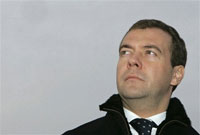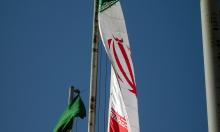Dmitry Medvedev’s popularity grows by leaps and bounds
Dmitry Medvedev, the person who has already won the reputation of Russia’s next president after Vladimir Putin named him his successor, continues to win more and more popularity in Russia nationwide. The majority of those Russians who will go to the polls on March 2, 2008 say that they will vote for Medvedev.

Medvedev has already become a new political icon for many Russians across the nation. His rating has been growing by leaps and bounds recently. A poll conducted by Russia’s Public Opinion Research Center on January 19-22 among 1,600 Russians, showed that 82 percent of the polled would be ready to vote for Medvedev if election took place next Sunday.
As for other candidates, they all fall far behind Dmitry Medvedev. Vladimir Zhirinovsky, the leader of the Liberal and Democratic Party of Russia, follows Putin’s protégé with only 7.5 percent of supporters. Gennady Zyuganov, the head of the Communist Party, comes third with 6.1 percent of votes.
Observers say that Medvedev’s popularity skyrocketed when Putin announced his intention to chair the Russian government after the presidential election. People started looking at the two as a along-term tandem. As long as the incumbent president enjoys the support of the majority of Russians, the latter automatically developed a fondness for his successor.
No one doubts in Dmitry Medvedev’s victory in the first stage of elections. One may say that the question of Russia ’s next president has been already solved.
Medvedev was born on September 14, 1965 to a family of university teachers and raised in a proletarian suburb of Leningrad — Kupchino.
He graduated from the Law Department of Leningrad State University in 1987 (together with Ilya Yeliseyev, Anton Ivanov, Nikolay Vinnichenko and Konstantin Chuychenko) and in 1990 got his PhD in private law from the same university. Anatoly Sobchak, an early democrat politician of 80's and 90's, was one of his professors, and Medvedev later participated in Sobchak's successful Saint Petersburg mayorial campaign. In 1990 he worked in Leningrad Municipal Soviet of People's Deputies. Between 1991 and 1999 he worked as a docent at his old university, now renamed Saint Petersburg State University. In 1991 - 1996 Medvedev also worked as a legal expert for the Committee for External Relations of the Saint Petersburg Mayor's Office under Vladimir Putin.
In November of 1999 he became one of several St. Petersburgers brought by Vladimir Putin to top government positions in Moscow. In December of the same year he was appointed deputy head of the presidential staff.
Dmitry Medvedev became one of the politicians closest to President Putin, and during the 2000 elections he was head of the presidential election campaign headquarters. From 2000 to 2001, Medvedev was chair of Gazprom's board of directors. He was then deputy chair from 2001 to 2002. In June of 2002, Medvedev became chair of Gazprom's board of directors for a second time. In October 2003, he replaced Alexander Voloshin as presidential chief of staff. In November 2005, he was appointed by President Vladimir Putin as First Deputy Prime Minister, First Deputy Chairman of the Council for Implementation of the Priority National Projects attached to the President of the Russian Federation, and Chairman of the Council's Presidium. A mild-mannered person, Dmitry Medvedev is considered to be a moderate liberal pragmatic, an able administrator and a loyalist of Putin.
Prepared by Dmitry Sudakov
Pravda.ru
Subscribe to Pravda.Ru Telegram channel, Facebook, RSS!





